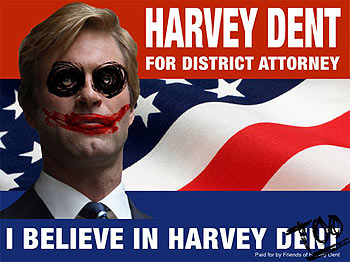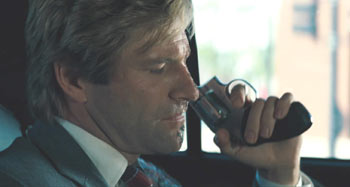In Defense Of Harvey Dent
Published on March 30th, 2009 in: Comics, Issues, Movies, Over the Gadfly's Nest |By Lisa Anderson
Okay—it’s all over, including the shouting. The late Heath Ledger won the Oscar for Best Supporting Actor of 2008, after winning numerous other awards in the same category. I was rooting for someone else for Oscar, but I don’t begrudge Heath his award. That said, I don’t think that Heath made The Dark Knight what it was by himself.
What set The Dark Knight apart was its tone. One critic used the phrase “Stygian bleakness”—”Stygian” referring to the River Styx, which ran through the underworld in the myths of the ancient Greeks. While I’m sure that it has similarities with many other movies, it manages to explore new and uniquely flavored moral depths. Most of them are plumbed by Aaron Eckhart, in his role as district attorney Harvey Dent.

Dent starts out as a classic hero: good-looking, bold, competent, and committed to making the world a better place. He has the love of a woman—Rachel Dawes—with all the same characteristics. In quick succession, however, he loses everything. He and Rachel are kidnapped by the Joker’s henchmen. He has to listen to her last moments over radio, which easily qualifies as psychological torment. This devastating lost is compounded by unimaginable physical suffering when he is severely burned.
Underneath all of this, Dent breaks. All it takes is a small push from the Joker, acting as the messenger of chaos. Dent embraces an old nickname—”Two-Face”—and sets out for revenge. In the end, Batman takes the blame for Dent’s crimes, so that the citizens of Gotham will not be disillusioned by the loss of their “White Knight.”
Along the way, we had seen the cracks in Dent’s foundation. Previously, he had threatened one of the Joker’s minions with death, staking the man’s life on the flip of a coin. He is so afraid for Rachel that he loses sight of what he stands for, both publicly and privately: the rule of law. Only Batman is able to stop him, pointing out that his actions put his legal work and the public morale in jeopardy. Even after that, however, Dent retains a sort of tragic, selfless nobility. When Batman comes to save him, he is upset that he’s not saving Rachel instead.
Relative to such complexity, the Joker functions more like a force of nature than a character. We never learn his real name, and we only see him without makeup for an instant. He tells several conflicting stories about how he acquired his grisly scars, and we never learn which one is true. Ledger makes it easy to believe that the Joker has a back-story, that he was a whole person at some point, but whether by nature or nurture, there’s nothing left of that person by the time the movie’s narrative starts.
By contrast, however, the film’s initial protagonists both seem to retain their power of choice. After his final confrontation with Batman, Dent’s lucky coin is found to have the same face on both sides. Every coin toss he called was essentially rigged. The Joker’s newfound evangelist of Chance, Dent had railed to Gordon about the “cruel” world and the “indecent” times they lived in—but he was still choosing his actions based on their outcome. Batman (and his alter ego, Bruce Wayne) faces some of the same challenges as Dent—the loss of Rachel and the Joker’s mind games—but he never breaks his “one rule”—not to kill—even though all of Gotham thinks he has. In the end, Dent and Wayne both fulfill Dent’s pithy quip from early in the film: “You either die a hero, or you live long enough to see yourself become the villain.” Their stories unfold in opposite ways because of the choices that they make. In this way, The Dark Knight shows how people become living symbols of ideas, and how legends can often be more important than “truth.”

Heath Ledger made an amazing contribution to film in The Dark Knight. More than one person I know has said of his performance, “That wasn’t acting—that was channeling.” No one will fill those shoes in this incarnation of he franchise again—or possibly ever. By contrast, ironically, there are fans who believe that Two-Face will be back, even though he seemed to die in the story. Either way, the overlooked role of Harvey Dent, a.k.a. “Two-Face,” is what makes The Dark Knight the groundbreaking film that it is.
One Response to “In Defense Of Harvey Dent”
April 16th, 2009 at 1:51 pm
I concur completely – I left the theater not just blown away by our li’l Heath, but by Eckhart’s performance and the incredibly well-drawn character of Harvey Dent. His suffering is immense and if I did any weeping, it was for him. (And I did do some weeping.)
Time limit is exhausted. Please reload the CAPTCHA.